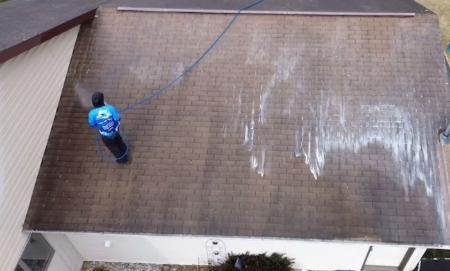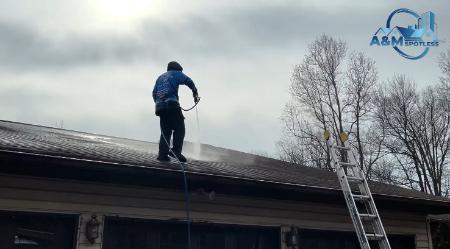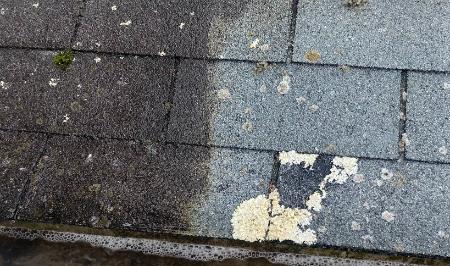How Much Does Roof Cleaning Cost in 2024?

Hey there! Have you ever looked up at your roof and thought, "Wow, that looks kind of... grimy?" You're not alone. Roofs often get overlooked in home maintenance, but keeping them clean is super important. That's where **roof soft washing** comes in.
So, what exactly is roof soft washing? In simple terms, it's a cleaning method that uses low-pressure water mixed with special cleaning solutions to gently remove dirt, algae, moss, and other gunk from your roof.
Now, you might be wondering, "Why should I care about soft washing?" Well, for starters, it’s not just about looks—though who doesn’t love a clean, shiny roof? Regularly cleaning your roof can actually help prevent damage and extend its lifespan. Plus, it’s a great way to boost your home’s curb appeal, making it look fresh and well-maintained.
In this guide, we’re going to dive deep into everything you need to know about roof soft washing. So you can be a roof soft washing expert yourself!
How Much Does Roof Soft Washing Cost?
The average American roof size for a residential home is 1,700 square feet which can range from $400 - $1,200. When hiring a cleaner, be prepared for higher estimates if you have a multi-story home. Typically, if you live in a more humid environment your roof could be worse and be more prone to damage.
Make sure to always collect different quotes from other companies. A reputable company should offer clear, upfront pricing with no hidden fees.
Benefits of Roof Soft Washing
You might be thinking, "Is it really worth it to clean my roof?" The answer is a resounding yes! Roof soft washing offers a bunch of benefits that go beyond just making your home look nice. Let's break down some of the top reasons why it's a smart move.
Prolonging Your Roof’s Lifespan

First up, let’s talk about protecting your investment. Your roof is one of the most expensive parts of your home, and it’s constantly exposed to the elements. Over time, things like algae, moss, and lichen can start to grow and settle in. These little invaders aren’t just an eyesore; they can actually eat away at your roofing materials, causing damage and reducing the lifespan of your roof. Soft washing gently removes these harmful growths without damaging your shingles or tiles, helping your roof last longer.
Enhancing Your Curb Appeal
We all know that first impressions matter, and the outside of your home is the first thing people see. A clean roof can make a world of difference in your home’s overall appearance. Whether you’re looking to sell your home or just want to impress the neighbors, a freshly washed roof can significantly boost your curb appeal. Imagine pulling into your driveway and seeing a roof that looks almost new—it's a great feeling!
Prevent Damage to Roofing Materials
High-pressure washing can be too harsh for some types of roofing materials, leading to potential damage like broken shingles or tiles. That’s where soft washing shines. The low-pressure approach is gentle on your roof, ensuring that the cleaning process doesn't cause any unintended harm. This is especially important for roofs made of more delicate materials, like slate or wood shingles, which can easily be damaged by too much pressure.
Soft washing also helps prevent water from getting under the shingles, which can happen with high-pressure methods. This is crucial because water infiltration can lead to rot, mold, and other costly issues. By choosing soft washing, you’re taking a safer, more effective approach to roof maintenance.
How Roof Soft Washing Works
Now that we've talked about why roof soft washing is worth it, you might be curious about how it actually works. Don’t worry, it’s not as complicated as it might sound. Let’s walk through the process, from the tools used to the cleaning solutions involved.
Equipment Used in Soft Washing
The first thing you should know is that soft washing uses specialized equipment designed to be gentle yet effective. Unlike traditional pressure washing systems, which rely on high-pressure water jets, soft washing systems use a pump that applies water at low pressure. This low-pressure system is key because it minimizes the risk of damaging your roof while still effectively cleaning it.
The equipment typically includes a pump, a hose, and a spray wand or nozzle. The wand allows for precise application, so the cleaning solution can be evenly distributed across the roof surface. Some setups also include a special mixing tank where the cleaning solution is prepared before being applied.
Types of Cleaning Solutions
The magic of soft washing doesn’t just come from the equipment—it’s also in the cleaning solutions used. These solutions are specially formulated to tackle organic growth like algae, moss, and lichen, which are common culprits behind dirty roofs.
Most soft washing solutions are biodegradable and eco-friendly, which means they won’t harm your landscaping or the environment. These solutions often contain a mix of water, surfactants (which help break down dirt and grime), and mild biocides that kill algae and other microorganisms. The biocides are particularly important because they help prevent these pesky organisms from coming back anytime soon.
Process of Application and Rinsing

The actual process of soft washing is pretty straightforward. Here’s a step-by-step rundown:
- Preparation: First, any delicate plants and landscaping around your home are protected, usually by covering them with tarps or rinsing them with water to dilute any runoff.
- Applying the Cleaning Solution: The technician will use the soft washing system to apply the cleaning solution to your roof. The solution is applied at low pressure, so there’s no risk of blasting away shingles or tiles.
- Dwell Time: After application, the solution needs some time to work its magic. This "dwell time" allows the cleaning agents to break down the dirt, grime, and organic growth on your roof. The time can vary depending on the severity of the dirt and the type of growth being treated.
- Rinsing: Once the solution has done its job, the roof is rinsed with low-pressure water. This step removes the loosened dirt and dead organisms, leaving your roof looking fresh and clean.
- Final Walkthrough Check: Finally, a thorough inspection is done with the home owner to ensure all areas are clean and no damage has occurred during the process.
Common Issues Addressed by Roof Soft Washing
Roofs face a lot of challenges over the years, from harsh weather conditions to the gradual buildup of dirt and organic matter. Soft washing is an effective solution for tackling a variety of common roof issues. Let’s explore the specific problems that roof soft washing can address and why it’s so beneficial.
Algae, Moss, and Lichen Removal
One of the most common problems homeowners face is the growth of algae, moss, and lichen on their roofs. These organisms thrive in moist, shaded environments, making your roof an ideal habitat. The most notorious among them is *Gloeocapsa magma*, a type of algae that causes unsightly black streaks on roofs.
Moss and lichen are not just an aesthetic concern; they can cause real damage. Moss, for example, retains moisture, which can lead to the degradation of roofing materials over time. Lichen, which is a symbiotic relationship between algae and fungi, can also penetrate and weaken the protective outer layer of your roof.
Soft washing effectively removes these organisms. The specialized cleaning solutions used in soft washing kill algae, moss, and lichen at their roots, preventing them from growing back quickly. This not only cleans your roof but also helps protect it from future infestations.
Removing Dirt, Grime, and Stains
Over time, roofs accumulate a layer of dirt, dust, and grime. This can dull the appearance of your home and make it look older than it actually is. Stubborn stains, such as those from air pollution or tree sap, can also be tough to remove.
Soft washing is highly effective at lifting and washing away these contaminants. The low-pressure water and cleaning agents work together to gently dissolve and rinse away dirt and stains without damaging your roof's surface. This not only improves the look of your home but also helps to prevent the buildup of substances that can hold moisture against your roof.
Preventing Mold and Mildew Growth

Mold and mildew are not just problems for interior spaces; they can also grow on roofs, especially in humid climates. These fungi can spread rapidly, and their spores can even find their way into your home, potentially causing health issues.
The cleaning solutions used in soft washing contain biocides that are effective in killing mold and mildew. By eliminating these fungi from your roof, soft washing helps prevent health risks associated with mold exposure and keeps your roof and home cleaner.
Addressing Other Organic Matter
In addition to algae, moss, lichen, mold, and mildew, other organic materials like leaves, twigs, and bird droppings can accumulate on your roof. While they might seem harmless, these materials can trap moisture and lead to rot or other damage. Soft washing clears away these organic materials, ensuring that your roof stays clean and in good condition.
DIY vs. Professional Roof Soft Washing
When it comes to roof soft washing, you might be wondering whether to tackle the job yourself or hire a professional. Both options have their pros and cons, so let’s break them down to help you make an informed decision.
Pros and Cons of DIY Roof Soft Washing
Pros:
- Cost Savings: One of the biggest advantages of doing it yourself is saving money on labor costs. If you have the equipment and materials, DIY can be a more budget-friendly option.
- Flexibility: You can schedule the cleaning at your convenience, without having to coordinate with a service provider’s availability.
- Control: Doing the job yourself gives you complete control over the cleaning process, allowing you to work at your own pace and according to your standards.
Cons:
- Safety Risks: Working on a roof involves risks, including falls and injuries. If you’re not experienced or don’t have the proper safety equipment, the risks can be significant.
- Equipment and Expertise: Roof soft washing requires specific equipment and knowledge. Without the right tools and experience, you might struggle to achieve the desired results or could inadvertently damage your roof.
- Time and Effort: The process can be time-consuming and physically demanding. It might take more effort than anticipated, especially if you’re not familiar with the techniques and equipment.
When to Hire a Professional Service
Pros:
- Expertise and Experience: Professional roof soft washing companies have the expertise to handle various types of roofs and cleaning challenges. They know the best techniques and solutions to use for effective and safe cleaning.
- Proper Equipment: Professionals come equipped with high-quality, specialized equipment that ensures a thorough and efficient cleaning process. This includes safety gear and tools designed for soft washing.
- Time Efficiency: Professionals can complete the job more quickly than most DIYers, thanks to their experience and efficient techniques. This means less disruption to your daily routine.
- Comprehensive Service: Many professional services include additional benefits, such as thorough inspections, warranties, and post-cleaning checks to ensure everything is in order.
Cons:
- Cost: Hiring a professional service comes with a cost that includes labor, equipment, and materials. It’s often more expensive than doing it yourself.
- Scheduling: You’ll need to coordinate with the service provider’s schedule, which might require some flexibility on your part.
- Potential for Less Control: While professionals generally offer high-quality work, you might have less direct control over the process compared to a DIY approach.
What to Look for in a Reputable Roof Soft Washing Company
If you decide to go with a professional service, here are some key factors to consider:
- Credentials and Certifications: Look for companies with proper licensing and certifications. This ensures they meet industry standards and are qualified to perform roof soft washing.
- Insurance and Warranties: Make sure the company carries insurance to protect you in case of any damage or accidents. Warranties can also provide peace of mind, guaranteeing their work.
- Experience and Reputation: Check the company’s track record and customer reviews. Experience in handling various types of roofs and positive feedback from previous clients are good indicators of reliability and quality.
- Transparent Pricing: A reputable company should offer clear, upfront pricing with no hidden fees. Get a detailed estimate before the work begins to avoid surprises.
Ultimately, whether you choose to DIY or hire a professional depends on your comfort level, budget, and the complexity of the job. For the best results and peace of mind, hiring a professional roof soft washing service is often the smarter choice.
Frequently Asked Questions About Roof Soft Washing
As with any home maintenance task, roof soft washing comes with a lot of questions. Here are some of the most common queries homeowners have about the process:
How Often Should a Roof Be Soft Washed?
The frequency of roof soft washing can depend on several factors, including your local climate, the type of roofing material, and the presence of environmental factors like trees and pollutants. Generally, it’s recommended to soft wash your roof every 1 to 3 years.
- Climate Considerations: In humid or rainy areas, algae and moss may grow more quickly, necessitating more frequent cleanings.
- Type of Roofing Material: Some materials, like asphalt shingles, might need more regular cleaning compared to others, like metal or tile roofs.
- Environmental Factors: If your home is surrounded by trees or experiences significant pollution, you might need to clean your roof more often to remove debris and prevent growth.
Is Soft Washing Safe for All Types of Roofs?
Soft washing is designed to be a gentle and safe method for cleaning various types of roofing materials. However, its effectiveness and safety can vary depending on the material:
- Asphalt Shingles: Soft washing is generally very effective and safe for asphalt shingles. It removes algae, moss, and other debris without causing damage.
- Metal Roofs: Metal roofs can also benefit from soft washing, as it effectively cleans without risking the integrity of the metal. Care should be taken to avoid scratching or denting the metal.
- Tile and Slate Roofs: Soft washing is suitable for tile and slate roofs, provided the cleaning solution and technique are appropriate for these more delicate materials.
- Wood Shingles: Wood shingles require special attention due to their porous nature. Soft washing can clean them effectively if the right solutions are used and applied correctly.
What Are the Costs Associated with Roof Soft Washing?
- Size of the Roof: Larger roofs will generally cost more to clean due to the increased amount of labor and materials required.
- Roof Condition: If your roof has significant buildup or extensive growth, it may require additional time and effort to clean, potentially increasing the cost.
- Roof Material: The type of roofing material can influence the cost, with more delicate materials potentially requiring more careful and thus costly treatments.
- Location: Costs can also vary based on geographic location, with prices differing between regions and cities.
Trust the professionals at A&M Spotless today. For any house washing grime, give us a call at (484.255.4478). GET YOUR FREE SOFT WASHING OR PRESSURE WASHING QUOTE TODAY!!!